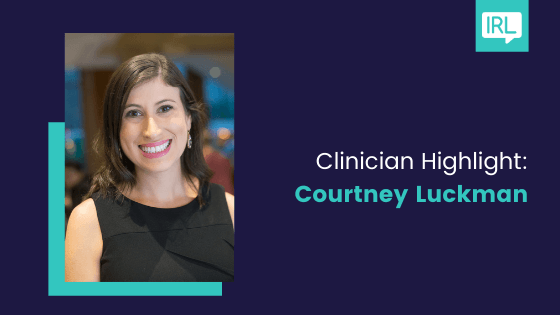Courtney Luckman MA, CCC-SLP first came to speech IRL as a client for help with stuttering in 2013. She had recently completed her bachelors in Psychology and Cognitive Science and was interning at the Lincoln Park Zoo, studying primate behavior and working with great apes! Courtney quickly developed a friendship with Katie Gore, who became her mentor. Once she got involved with the stuttering community, Courtney realized that speech pathology was her true passion.
As a person who stutters, it was important to Courtney to make her involvement with that community a part of her career. It’s her personal mission to “help people find their true potential, to belong and connect in a world where they have difficulty connecting and belonging.” Through her work, Courtney embraces the core values of connecting to others, courage, and self-mastery.
Courtney’s Areas of Expertise
Courtney has been practicing for 4 years professionally, and she specializes in stuttering, social communication, and expressive language. She notes that most of the people she works with are getting by and have a good life overall, but have something they want to improve with their speech or communication. About half of her time is dedicated to clients and weekly groups, and the other half is split between research projects, intakes, blog posts, and continuing education work.
“The reason that we do what we do and the reason I’m so passionate about this—think about all the kids that receive speech therapy in school. They grow up, and they still need that support. They still need that help.”
Courtney’s experience working with young adults who stutter and young adults on the autism spectrum in graduate school was what made her choose to work with speech IRL. Here she has the flexibility to work in both of those specialty areas while doing other kinds of projects as well.
A Day in the Clinic: Speech Therapy Stories
One thing that really energizes Courtney as a speech therapist is meeting with their parents, siblings, or friends in the client’s immediate circle to help them understand the disorder and facilitating conversations with them about how to best help their loved one. She also enjoys creating Small Talk Menus to teach her clients what kinds of things are okay to talk about in small talk, how to transition, and what follow-up questions to ask. It’s fun because even though a lot of people really hate small talk, the exercise really gets to the reasons why small talk is important.
Besides stuttering group, Courtney’s favorite thing about being a speech therapist is when she can tell her client is having a life-changing moment. They make the realization that “Oh my gosh, it is ok to stutter,” or they proudly report that they gave a presentation, said what they needed to say, or have started to disclose their stuttering instead of hiding it.
For example, one client had started speech therapy at an early age but confessed that she had never really talked to anyone in her life about stuttering. Her parents and coworkers had no idea she was struggling, but she cried all through her initial consult. Her job required a lot of talking and she would often try to hide her stuttering, change words, and ultimately faced a lot of hardships at work because of difficulty communicating. After about 10-12 weekly sessions with Courtney, her parents accompanied this client during her final sessions and their entire relationship had changed. She has since gone on to be involved in support groups and she is open and proud of her stuttering. She changed jobs recently because she felt empowered to interview for new positions.
While transformations like this are very rewarding to be a part of, Courtney has a few specific things she wishes that more people knew about speech therapy: “When it comes to adults, I wish people knew that 1. it is in our scope of practice to work on social communication skills, and 2. it is also in scope to do any type of counseling related to the communication disorder and how it impacts a person’s life, and 3. for most communication disorders there is no cure, or no quick fix.” Many people who receive speech therapy through school as children still benefit from therapy once they become adults, and these are the people that Courtney especially loves working with.
Courtney IRL
In everything she does, Courtney wants to put herself out of her comfort zone and take on new opportunities. She loves baking, writing, and traveling. She wants to get back to her roots working with animals, perhaps in a volunteer capacity. Courtney is getting married in August. Courtney and her fiance have one dog, Java, named after their love of coffee. Courtney writes a personal blog about her stuttering experiences and hopes to write a book about stuttering that’s a combination of memoir with research and clinical anecdotes. Her passion for research will probably bring her back to academia to get a Ph.D., but this time she would be more interested in studying human speech pathology rather than primates.
Check out Courtney’s weekly stuttering group and register today!

